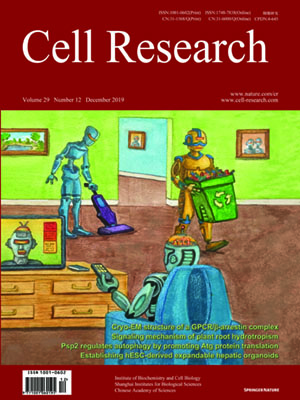
Volume 29, No 12, Dec 2019
ISSN: 1001-0602
EISSN: 1748-7838 2018
impact factor 17.848*
(Clarivate Analytics, 2019)
Volume 29 Issue 12, December 2019: 994-1008
ORIGINAL ARTICLES
Psp2, a novel regulator of autophagy that promotes autophagy-related protein translation
Zhangyuan Yin1, Xu Liu 1,3, Aileen Ariosa1, Haina Huang2, Meiyan Jin 1,4 , Katrin Karbstein2 and Daniel J. Klionsky 1
1 Life Sciences Institute, and the Department of Molecular, Cellular and Developmental Biology, University of Michigan, Ann Arbor, MI 48109, USA and 2The Scripps Research Institute, Department of Integrative Structural and Computational Biology, Jupiter, FL 33458, USA 3 Present address: Harvard Medical School, Department of Microbiology, Brigham and Women’s Hospital, Division of Infectious Diseases, Boston, MA, USA 4Present address: Department of Molecular and Cell Biology, University of California, Berkeley, CA 94720, USA
Correspondence: Daniel J. Klionsky (klionsky@umich.edu)
Macroautophagy/autophagy defines an evolutionarily conserved catabolic process that targets cytoplasmic components for lysosomal degradation. The process of autophagy from initiation to closure is tightly executed and controlled by the concerted action of autophagy-related (Atg) proteins. Although substantial progress has been made in characterizing transcriptional and post-translational regulation of ATG/Atg genes/proteins, little is known about the translational control of autophagy. Here we report that Psp2, an RGG motif protein, positively regulates autophagy through promoting the translation of Atg1 and Atg13, two proteins that are crucial in the initiation of autophagy. During nitrogen starvation conditions, Psp2 interacts with the 5′ UTR of ATG1 and ATG13 transcripts in an RGG motif-dependent manner and with eIF4E and eIF4G2, components of the translation initiation machinery, to regulate the translation of these transcripts. Deletion of the PSP2 gene leads to a decrease in the synthesis of Atg1 and Atg13, which correlates with reduced autophagy activity and cell survival. Furthermore, deactivation of the methyltransferase Hmt1 constitutes a molecular switch that regulates Psp2 arginine methylation status as well as its mRNA binding activity in response to starvation. These results reveal a novel mechanism by which Atg proteins become upregulated to fulfill the increased demands of autophagy activity as part of translational reprogramming during stress conditions, and help explain how ATG genes bypass the general block in protein translation that occurs during starvation.
https://doi.org/10.1038/s41422-019-0246-4
FULL TEXT | PDF
Browse 1092


